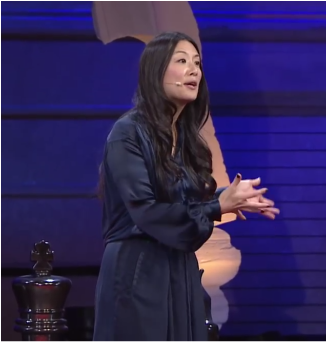 The study of gossip can shed light on social norms and values. The study of gossip can shed light on social norms and values. Tags: culture, discourse/language, knowledge, media, celebrities, gossip, popular culture, social norms, 11 to 20 mins Year: 2013 Length: 19:10 Access: TEDTalks Summary: In this TEDTalk, celebrity gossip columnist Elaine "Lainey" Lui discusses the “sociology of gossip.” Although gossip, she argues, is a topic often viewed as unrespected, unintellectual, and shameful, Lui frames gossip as an important form of knowledge and knowledge exchange, a tool that helps us understand and make sense of our social world. Positioning herself as a methodical scientist studying the social contexts, culture, and behavior of celebrity-dom, Lui historically contextualizes gossip as knowledge exchange by providing examples of: 1) ancient gossip about pharaohs and queens found within Egyptian hieroglyphics; and 2) contemporary celebrity headlines. Modern-day celebrity gossip, she argues, reflects society's current existence and frames “popular mores and ethics" around topics such as “marital convention, fidelity, feminist regression/progression, social violence, and sexual orientation.” The specific examples that Lui shares include: Drew Barrymore’s pregnancy and motherhood, Chris Brown’s rise in fame post his physical abuse of Rihanna, and rumors of John Travolta’s sexual orientation. She also includes the example of Kristen Stewart’s cheating scandal versus Ashton Kutcher’s. Stewart, a Hollywood starlet, cheats on her equally famous boyfriend, Robert Pattinson, with married Hollywood director Rupert Sanders. Once news breaks, Stewart is subsequently slut-shamed as a “trampire” and loses movie roles, while Sanders is not publicly shamed and, instead, continues to gain directing opportunities. In contrast, Kutcher cheats on his Hollywood wife, Demi Moore, with very little fan- and media-based shaming, and is offered a contract extension on a highly-watched sitcom, becoming the highest paid actor on network television. Lui suggests that when we gossip about the infidelities of celebrities like Stewart and Kutcher, we are “sharing [our] moralistic views on marriage and fidelity and social expectations of females in relationships”; therefore, “the way we gossip,” Lui states, “tells us more about us than about the celebrities.” Lui highlights how these cultural practices of engaging in celebrity gossip are refracted through our own biases and the “prism of our own experience,” shedding light on larger social value and belief systems. This video can be used in numerous sociology classroom settings. Specifically, because Lui discusses such topics as sexism, heterosexism, social violence, and the social construction of knowledge, instructors can use this video to illustrate how such concepts permeate media consumption. The video would also work well in tandem with the NPR story, Seriously Salacious: The 'Untrivial’ Gossip Tradition. Submitted By: Beverly M. Pratt
2 Comments
Manuel Franco
7/29/2023 01:50:42 am
I just want to say Thank You to everyone who supported me through the years. My name is Manuel Franco, New Berlin, Wisconsin. My story of how I won the Powerball lottery of $768.4M is a bit of a tale. I have been playing Powerball tickets for 6 years now since I turned 18. I bought my first ticket on my 18 birthday. I was feeling very lucky that day because I had contacted Dr. Odunga Michael to help me with the winning Powerball numbers. I really had that great great feeling that I looked at the camera wanting to wink at it. I only did a tiny part of it and trusted him. He gave me the numbers after I played a couple other tickets along with it for $10. I checked my ticket after the winnings came online and saw the numbers were correct including the Power play. I screamed for about 10 minutes because it felt like a dream. I had won $768.4M. You can check my winning testimony with the lottery officials just with my name search. Thank you Dr Odunga. Well, his email is [email protected] and you can also call or Whats-app him at +2348167159012 so you guys can contact him
Reply
mark hold
7/7/2024 02:18:25 pm
One faithful day as i was watching a video on you tube i saw a comment of one MR PAUL HAVERSACK testifying of this great herbal healer doctor Moses Buba,That helped him enlarge his manhood .i was shocked and happy, so i quickly visited his website and emailed him within 30 mins he got back to me and told me all i need to buy and i did so after 4 days i received his herbal medicine ,he gave me instructions on how to use it ,as i am speaking to you people now after using the cream for just two weeks my manhood size is 10 inches long and 8.0 girth ,,am so happy and grateful for his work in my life thank you so much Doctor Moses buba ,,i also learnt he has cure for LOW SPERM COUNT,PREMATURE EJACULATION,ERECTILE DYSFUNCTION,HIV/AIDS VIRUS,DIABETES 1/2,HERPES DISEASE,CANCER,and lots more
Reply
Leave a Reply. |
Tags
All
.
Got any videos?
Are you finding useful videos for your classes? Do you have good videos you use in your own classes? Please consider submitting your videos here and helping us build our database!
|
 RSS Feed
RSS Feed
